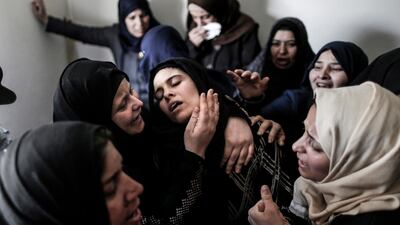A Palestinian teenager has died of his wounds after the Israeli military shot him in the head at a rally in Gaza on Friday, further increasing the death toll as families mourned their lost ones at funerals in the enclave.
Azzam Oweida, 15, was shot during a rally in southern Gaza, the enclave’s health ministry confirmed. Hundreds gathered at his family home in the southern town of Khan Younis to attend his funeral and pay their respects.
Mourners carried his body, wrapped in a Palestinian flag, to a nearby mosque for prayers before burial. "My son is a martyr and I am very proud of him," said his father, Helal Oweida.
Mr Oweida is the fourth Palestinian to die as a result of Israeli shootings across the Gaza border on Friday as Palestinians engaged in the fifth round of weekly rallies in the build-up to the Nakba Day, the commemoration of the day the Palestinians believe to be their day of “catastrophe”.
His death came after Zeid Ra’ad Al Hussein, the United Nations high commissioner for human rights, had called for restraint from Israel.
Mr Oweida is the fifth child to be killed by Israel since the end of March. Three of them have been killed by a bullet to the head or neck.
A total of 42 Palestinians have been killed and more than 1,500 wounded in the rallies that began with what was known locally as the Great March of Return on March 30. Those protests call for the right of return for refugees to what is now Israeli territory after the country’s creation in 1948.
Israel’s military said that thousands had engaged in “riots” at the shared Israel-Gaza border on Friday and had used “riot dispersal means”. It also said it stopped an attempted infiltration into Israeli territory by Palestinian protesters. But rights groups and international organisations have condemned what they say is indiscriminate fire at unarmed protesters.
Some of the protesters have burnt tyres, while others have thrown rocks and flown kits dangling objects to target the Israeli forces stationed on the border. Israel has suffered no casualties in the five rounds of protest.
Israel accuses Hamas, the Palestinian militant group that oversees the enclave, of instigating the protests and says militants are using civilians as human shields. It holds the group responsible for any violent action that emanates from the coastal strip.
Both the European Union and the United Nations Secretary-General have called for an investigation into the killings. The UN envoy for the conflict warned on Thursday that Gaza could explode at any moment because of rising tensions over the rallies and the shootings.
“Old wounds continue to bleed and deepen as we speak, risking the outbreak of another war,” Nikolay Mladenov, the UN Special Coordinator for the Middle East Peace Process, told the UN Security Council. He called Gaza “a powder keg” that needs to be stopped from being ignited by changing the security and economic situation in the territory.
“People should not be destined to spend their lives surrounded by borders they are forbidden to cross, or waters they are forbidden to navigate”, he said. “They should not be destined to live under the control of Hamas, which invests in militant activities at the expense of the population”.
_______________
Read more:
Palestinians bury Gaza journalist killed by Israeli fire
Israel denies man shot by sniper access to medical treatment
US removes word ‘occupied’ from annual report on Palestinian Territories
_______________
Hamas has fought three wars with Israel since 2008. The most recent, a seven-week summer conflict in 2014, resulted in the deaths of more than 2,200 Palestinians, according to UN figures.
More than two million Palestinians live in the narrow coastal territory. Israel withdrew its troops and settlers from Gaza in 2005 but it maintains restrictive control of its land and sea borders. Egypt also restricts movement in and out of Gaza on its border.
Egypt opened the Rafah border crossing in Gaza on Saturday for three days to allow medical patients in and out.
The Palestinians are seeking an independent, sovereign state that includes Gaza and the West Bank, with East Jerusalem as its capital. But their prospects appear more distant than ever.
US President Donald Trump has angered the Palestinians and its friends in the Arab world by announcing that he will relocate the US embassy in Tel Aviv to Jerusalem next month to coincide with the 70th anniversary of Israel’s creation as a state. That move was subsequently labelled a provocation because it falls on the same date as Nakba Day.
"They deliberately chose a tragic day in Palestinian history, the Nakba, as an act of gratuitous cruelty adding insult to injury," tweeted a livid senior Palestinian official, Hanan Ashrawi, at the time.
As Trump appears to be become more aligned with Israel’s positions in the eyes of the Palestinians as every day of his administration passes, they may now need the international community more than ever.

